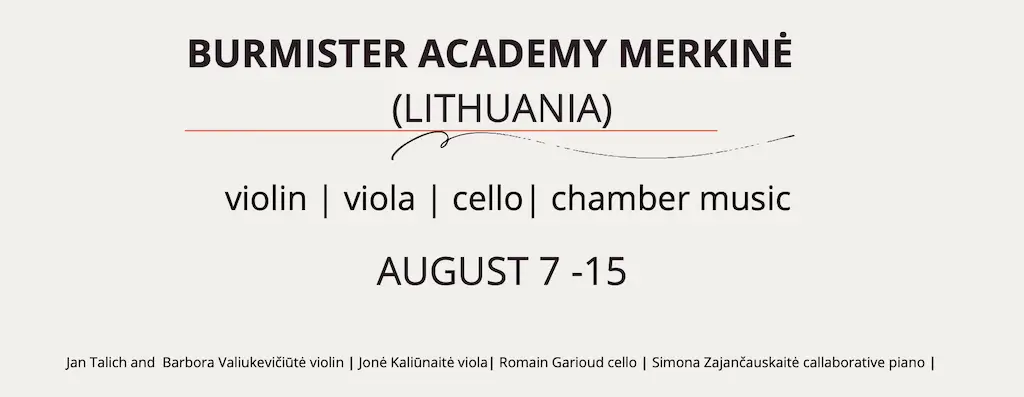In the heart of Lithuania’s breathtaking Dzūkija National Park, in the historic town of Merkinė where pine forests meet ancient rivers and history whispers through cobbled paths, a quiet revolution in music education is taking place. Burmister Academy, returning for its third edition from 7 to 15 August 2025, is not just another summer masterclass—it’s an audacious reimagining of what it means to learn, perform, and grow as a classical musician today.
Founded by Lithuanian violinist and educator Barbora Valiukevičiūtė and organised under the auspices of the festival Koncertai Burmistrui, the Academy is proudly sponsored by the Lithuanian Council of Culture and the Varėna municipality. It aims to inspire, educate and empower the next generation of violinists, violists, cellists and chamber musicians—fusing world-class artistic mentorship with an unwavering commitment to social awareness, cultural exchange and environmental stewardship.
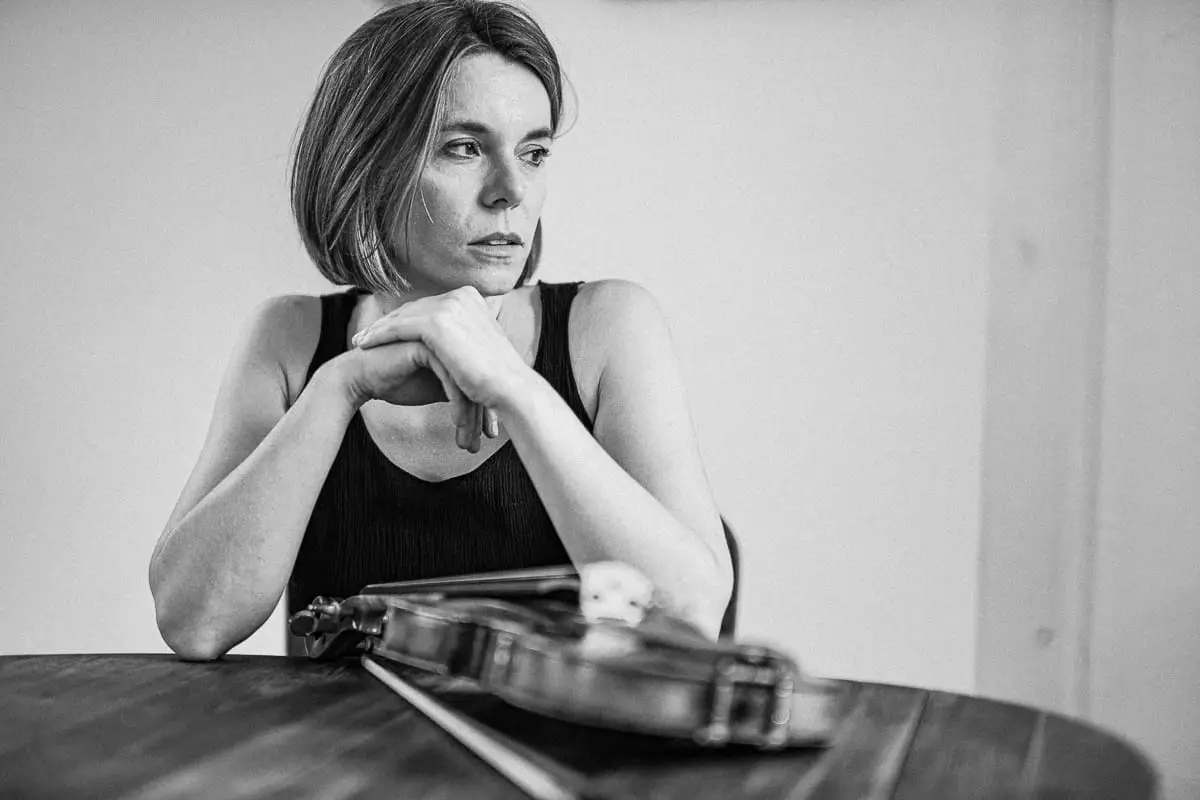
A Vision Rooted in Experience
Barbora’s journey—from her formative years in Kaunas to advanced studies at the Manhattan School of Music and Stony Brook University—laid the groundwork for Burmister Academy’s ethos. “Having experienced diverse educational approaches, I deeply value meaningful artistic mentorship,” she reflects. “After founding Koncertai Burmistrui, expanding into youth education felt like a natural progression. Now, Burmister Academy provides an immersive environment where young musicians not only grow technically and musically but also develop artistic courage, collaboration and social awareness.”
The Academy’s holistic vision places artistic excellence and human values on equal footing. Barbora is keen to emphasise that students should leave not only more accomplished performers but also thoughtful advocates: “Beyond music, we encourage students to think critically about their roles in society, empowering them to become confident leaders who use their musical voices to champion diversity and meaningful cultural exchange.”
Lessons Beyond Technique
Over eight intensively curated days, participants receive 3–4 tailored solo lessons, chamber-music coaching, and performance opportunities in Merkinė’s historic venues. Barbora explains why this multifaceted approach is vital:
“Individual lessons build personal discipline and confidence; chamber coaching teaches collaboration, communication and empathy; studio classes foster a supportive environment for creative exploration; concert performances encourage courageous self-expression. And beyond structured learning, sharing lunches, dinners and conversations creates a friendly atmosphere where students feel encouraged rather than competitive.”
The programme also integrates local excursions, environmental workshops in Dzūkija National Park, and collaborative projects—such as the ongoing restoration of Merkinė’s historic church organ—underscoring the Academy’s commitment to cultural legacy and ecological awareness.
Meaningful Growth
What truly distinguishes Burmister Academy, according to Barbora, is its insistence that musical excellence and meaningful artistic growth go hand in hand:
“Our students learn from artists who are leaders in their fields and model compassion and integrity. We encourage them to think critically about their roles in society, empowering them to become confident leaders who use their musical voices to advocate for diversity, social awareness and cultural exchange.”
Each day blends individual coaching with collaborative chamber rehearsals—where lessons in communication and empathy rival those in technical mastery—and culminates in public performances. Informal gatherings—shared meals, fireside conversations and spontaneous chamber jams—foster camaraderie over competition, nurturing an atmosphere of warmth and mutual encouragement.
Distinguished Faculty
Burmister Academy’s faculty reads like a who’s-who of the string world, each bringing a wealth of performance experience and pedagogical insight:
- Barbora Valiukevičiūtė (Violin & Founder)
- Jan Talich (Violin, Conductor & Chamber Music)
- Jonė Kaliūnaitė (Viola & Chamber Music)
- Romain Garioud (Cello & Chamber Music)
- Simona Zajančauskaitė (Piano)
Together, they ensure that students benefit not only from world-class technique and artistry but also from mentors who view music as a vehicle for empathy, dialogue and societal change.
Chamber Voices
Czech violinist, conductor, and educator Jan Talich embodies the Academy’s holistic spirit. A second-generation member of the renowned Talich Quartet—he joined in 1997 alongside his violist father—Jan’s multifaceted career spans solo performance, chamber music, conducting, and pedagogy.
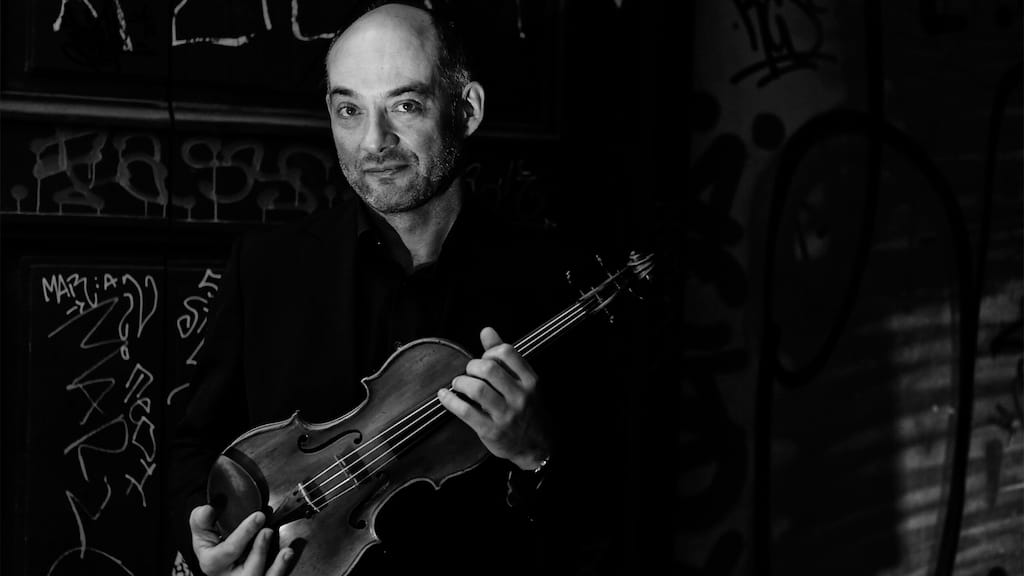
“A vital part of my musical development was playing chamber music, especially in a string quartet,” he reflects. “Every soloist should go through chamber-music training—it brings a much deeper understanding of phrasing, style, and music as a whole. Those years of hard work with the quartet also helped me immensely in conducting—how to rehearse with an orchestra, how to understand the score.”
Jan’s teaching draws on a lifetime of absorbing diverse violin traditions. He describes his early influences as a “big mess”—ranging from Ševčík studies to the lineage of Yfrah Neaman, Thibaud, and Rostal—before gradually shaping them into his own voice. “As a teacher, I still discover new things with my students—that’s the never-ending life of a violinist,” he says.
Reflecting on his role in the Talich Quartet, Jan recalls: “At first, we tried to preserve the style and sound of the quartet’s first generation. Over time, we naturally developed our own identity, but I believe we still continue the grand Czech quartet tradition.”
He is particularly inspired by the setting of Merkinė. “In these unstable times, we should seek out places with deep cultural roots. I’m very much looking forward to discovering its profound history together with the students.”
A Synthesis of Traditions
Lithuanian violist Jonė Kaliūnaitė brings her own blended heritage to the Academy. Reflecting on the influence of her studies in Lithuania and Germany, she offers:
“My Lithuanian musical education taught me perseverance in achieving goals, a disciplined, sports-like approach to work, and a boundless idealism and love for music. Studies in Germany provided a deeper understanding of interpretation and historical context. The meticulous craftsmanship required for every note reflects German pedagogy. Together, these influences created an ideal synthesis: playing music must engage the intellect and careful attention, yet always spring from the deepest core of the heart.”
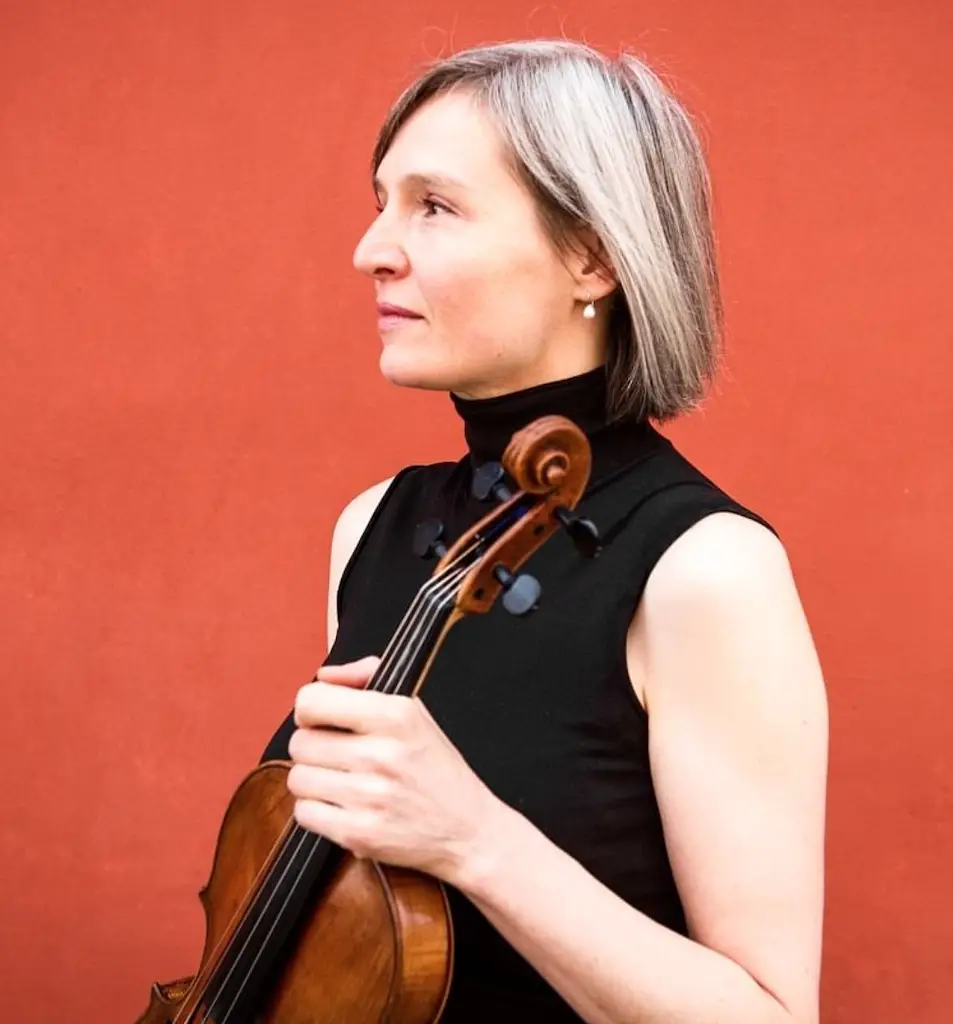
Her dual perspective underpins her teaching philosophy: rigorous technique infused with emotional authenticity.
Cello Conversations
French cellist Romain Garioud, whose résumé includes performances with Rostropovich, Presler and appearances at the Musikverein and Berlin Philharmonie, describes chamber music as “the real musical and human meeting.” He elaborates:
“It’s a lesson in listening, respecting each other, being flexible and adapting to differences proposed by fellow artists. More even than orchestral playing, it teaches us how to ‘live together’.”
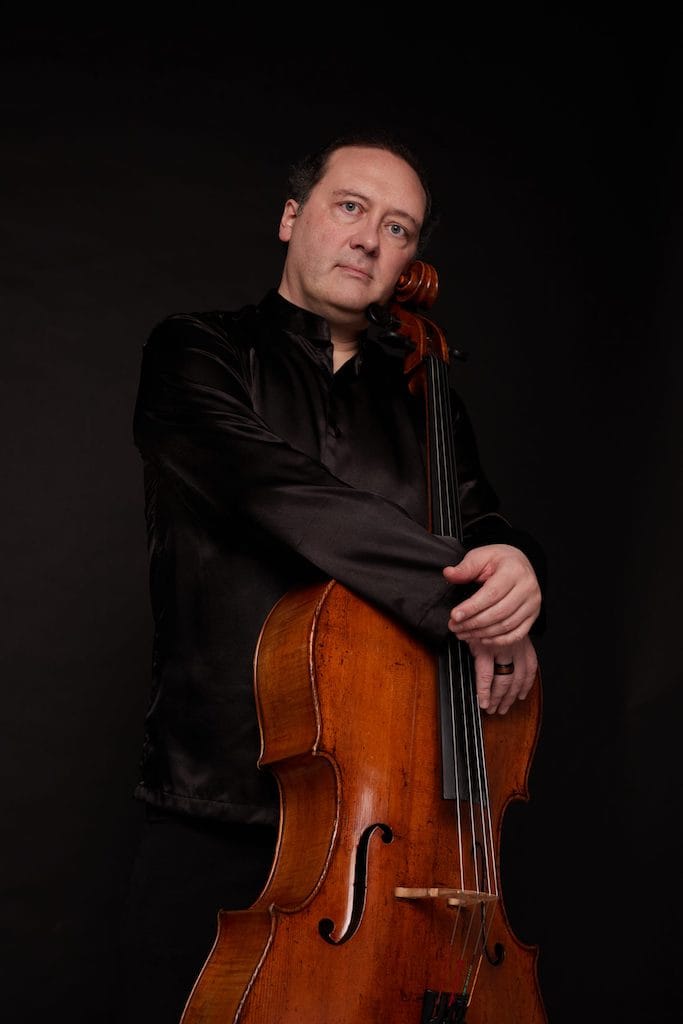
Romain’s teaching stresses self-awareness. “I use recordings to develop students’ perception of how and what they play, always guided by respect for the composer’s intentions,” he explains. “When balance is found between instrumental execution, cultural knowledge and my own interpretative ideas, I feel profoundly satisfied.”
A globally touring professor based in Darmstadt, he adapts his style to each student’s background: “I make them aware of the demands of good interpretation, help them realise their own artistic voice, and share my stage experience—sound production, physical attitude and even stress management.”
Merkinė’s storied past also resonates with Romain. “I feel surrounded by the souls of those who lived here,” he says. “That spiritual vibration deepens my inspiration. Playing and teaching in Merkinė shows how noble human values and resilience can overcome the worst.”
He also treasures his 1760 Gagliano cello: “It’s like meeting a very important person in one’s life—colourful, powerful, ever-surprising. After ten years, I’m still fascinated by its creative potential on stage.”
Place, History and Inspiration
Far more than a backdrop, Merkinė’s layered past—its medieval castle, multicultural crossroads and wartime trials—imbues every lesson and concert with poignant significance. Barbora explains:
“Merkinė’s rich history of resilience and artistic expression deeply shapes my artistic journey. Embracing multiculturalism, tolerance and reconciliation here feels especially significant today amid growing social polarisation.”
Beyond the music, students engage with local cultural institutions, join heritage tours and participate in environmental outings in the surrounding national park, forging lasting connections with the community. Evenings are filled with informal chamber jams, shared meals and spirited discussion, fostering a family-like atmosphere where lifelong friendships are born.
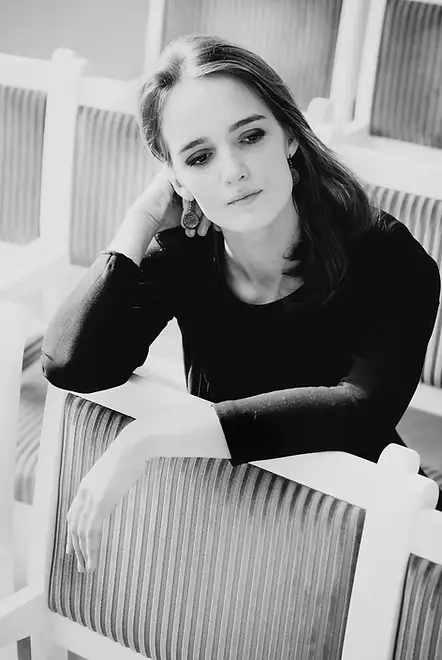
Applying to Burmister Academy
Open to violinists, violists and cellists from conservatoires, universities and music schools worldwide, Burmister Academy requires:
- A completed application form (with profile picture and short bio)
- A video of a recent performance
- A repertoire list for solo and chamber classes
- A non-refundable application fee of €25
Successful applicants will be notified within 10 days. Fees for the full course—tuition, meals, hostel-style accommodation, practice rooms, concert tickets, a professional photoshoot and final-concert recording—are €800. For those seeking only masterclasses without lodging and meals, the fee is €470. Travel and personal expenses are borne by participants. Applications close on 15 June 2025.
Looking Ahead
While firmly established as a summer intensive, Barbora dreams of a permanent home for Burmister Academy. “I see it growing into a year-round cultural centre or even a permanent school,” she enthuses. “A place for international exchange, community building and artistic education—enriching Lithuania’s cultural scene and connecting global communities through music.”
Leading this project “is deeply personal and profoundly meaningful,” she concludes. “It’s about weaving our work into Merkinė’s modern legacy—restoring its church organ, nurturing young artists, and contributing to a living cultural legacy that will resonate for generations.”
To apply or learn more about Burmister Academy 2025, please visit www.academybam.org or contact [email protected]. You can also reach WhatsApp at +370 6149 4932.
Source:https://serenademagazine.com/where-music-meets-meaning-inside-burmister-academy-2025/

